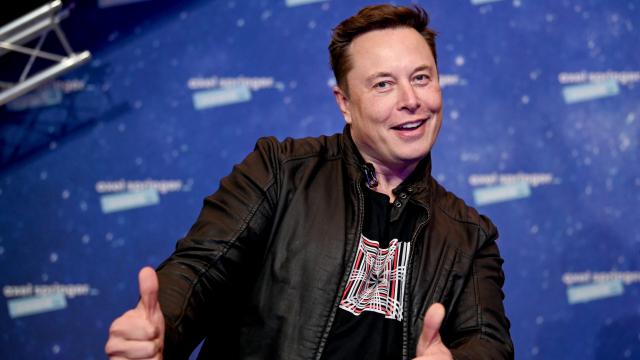Tesla and SpaceX CEO Elon Musk announced in a tweet on Thursday night he will be give a $US100 ($130) million prize for the “best” carbon capture technology. Very exciting!
I’m sure his years of running a Fortune 500 company, abusing workers and being too online make him very qualified to, uh, independently determine which technology has the greatest potential to sequester carbon pollution from the atmosphere. Nevertheless, I wanted to offer some contestants to consider for his prize! Please find my investment note for Elon below.
Elon, your car company spent last year chopping down a forest in Germany to clear space for a giant factory until some silly environmentalists stopped the process. But I’ve been doing some reading, and it turns out trees are super good at pulling carbon out of the air. It’s this innovative new technology called photosynthesis.
The most incredible thing is that within this ecosystem — or “sector” if you will — there’s work that’s already being done. The trees in the Tongass National Forest, the world’s largest intact temperate rainforest, have pulled roughly 650 million tons of carbon out of the atmosphere and are storing it in their trunks and roots. That’s equivalent to half of U.S. carbon dioxide emissions in 2017. And the Tongass is right here in the U.S. That’s what we in the biz call “synergy.”
You might consider handing that $US100 ($130) million to the ecologists working on keeping the Tongass healthy. A 2011 Department of Agriculture study found that the remaining watershed restoration work in the Tongass would cost just over $US100 ($130) million, so your fund could make a pretty huge difference here. You could also consider giving the money to the Indigenous groups that have been fighting for years to protect the forest from the threat of development.
These are good options for sure. But say you really want to push the envelope. I know you’re a hallucinogens man, after all. So here’s an idea: plants. No one in the clean energy game is going right to the source. But you could. Just hand the trees in the Tongass rainforest the $US100 ($130) million outright. That would really move the needle.
[referenced id=”1666333″ url=”https://gizmodo.com.au/2021/01/ted-cruz-suddenly-pretends-to-care-about-pittsburgh__trashed/” thumb=”https://gizmodo.com.au/wp-content/uploads/2021/01/22/bagdbe3vzwcfsawvsyzl-300×168.jpg” title=”Ted Cruz Suddenly Pretends to Care About Pittsburgh” excerpt=”Human-shaped oil slick Sen. Ted Cruz would like you to know he thinks you are dumb.”]
Forests aren’t the only option, either. There’s also wetlands, which are full of soil and vegetation that sequesters tons of carbon. I’m sure wetland ferns or trees like the swamp mahogany and the swamp she-oak would be stoked to receive $US100 ($130) million. Or maybe consider donating the money to the vegetation that lives in salt marshes, which are even better at sucking up carbon than land ecosystems! There’s some great candidates in salt marshes — can you imagine the creeping brookweed’s reaction to receiving all that money? That would be an incredible way to say thank you to those amazing rhizomatous plants, and could really push them to keep working. There’s also dirt itself, which is frankly underappreciated for the role it plays in actually storing the carbon.
Maybe you think the vegetation space is a little played out. Which, fair. The Salesforce guy wants to plant 1 trillion trees, and do you really wanna be competing with him for PR? Besides, Republicans are already claiming it. Only losers associate with those insurrectionists. The point of dropping a $US100 ($130) million prize is to make a splash.
So how about this: Consider the whale. Great whales accumulate carbon in their bodies over the course of their long lives. The best part is, when they die, they sink to the bottom of the ocean, sequestering all that carbon forever! Sadly, this is pretty thankless work right now — despite their amazing contributions to carbon capture technology, whales are under threat because of habitat degradation and climate change. But if you chose a whale species and gave them $US100 ($130) million, I’m sure that would provide them a much-needed confidence boost (and the cash needed to buy weapons to fend off any would-be whalers)!
But maybe whales are too out of sight, out of mind. Plus, who wants to be associated with death, am I right?
Well, let me offer up migratory birds, ever-present species that play key roles in making sure plants are around to sequester carbon. They’re unsung heroes of carbon capture. Or if you really want to get wild with it, why not fork the funds over to bees or other insects? Carbon-sucking ecosystems couldn’t function without insects! And that would show the world you’re willing to go out on a limb and support the little guy.
I hope this helps, Elon! Again, it’s not that I don’t trust you to do exactly what’s right for the planet all on your own or anything, I just know you’re busy, and I’m really excited about this project, so I wanted to offer my two cents. Oh, and consider this some freebie advice. Sure, the $US100 ($130) million prize is only 0.05% of your net worth, but I’m sure you’ll be putting the rest of your $US185 ($240) billion to work on other pressing problems any day now.
